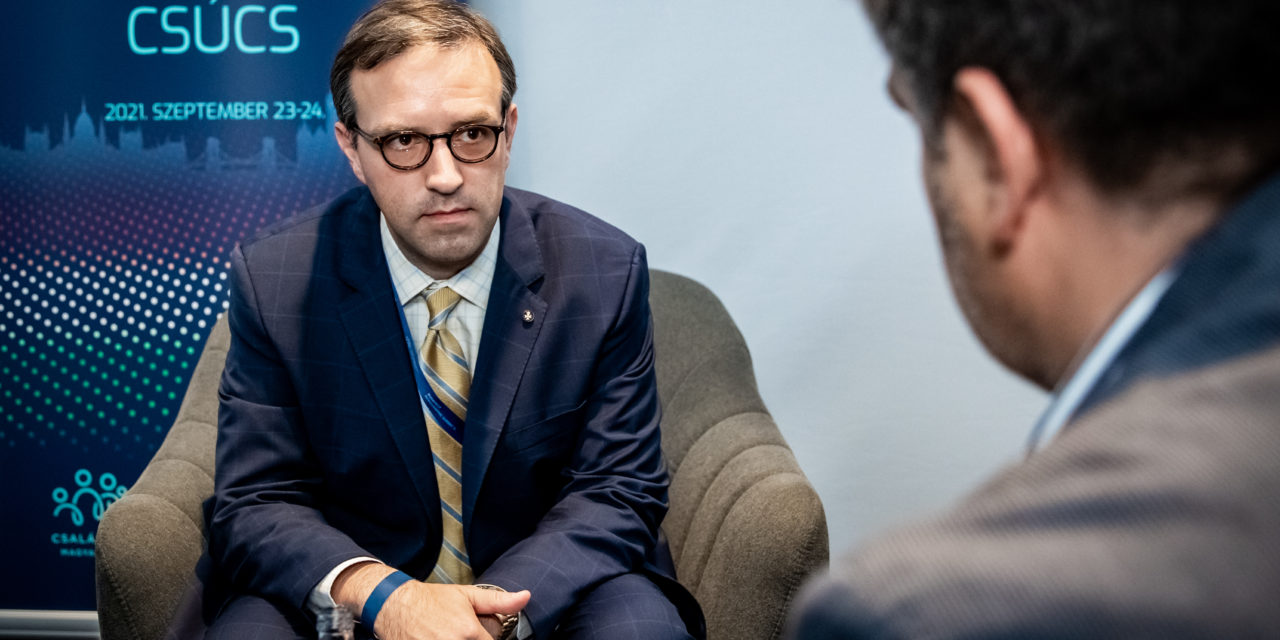American conservatives are looking for a workable conservative state model after their own project failed under Trump, and Hungary offers a new one, says Gladden Pappin. The American political scientist was asked by mandiner.hu about his experiences here and the conflicts of the international right and left. Budapest Demographic Summit .
I have been here in Budapest for a few weeks, and I will stay here for a year as a guest teacher at MCC. said the political scientist. When I arrived, I saw an ad on the subway featuring a pregnant woman advertising a prenatal vitamin. I was surprised, in a positive way - you don't often see such a photo on the street in America these days. Instead, in our public advertisements, methods of contraception are promoted, dating sites are promoted, and forms of cohabitation recommended instead of the family are promoted. I know that the level of advertising is only the surface, but this world also symbolically shows the difference:
In Hungary, life and having children are promoted, and this is really necessary, because the family represents the future, the family is the heart of society. I think everyone feels in their hearts that, although the choice of non-traditional forms of coexistence is a matter of individual freedom, it still degrades our relationships.
Donald Trump lost the election. And American conservatives are trying to find a good example of how conservative policies can work in practice today. It is no coincidence that in 2021, the attention of American conservatives turned to Hungary. And a little to Poland too.
Hungary is a small country, but it has a huge intellectual impact. Today, this country is a laboratory of conservative policies. In fact, it is even lucky that it is a small country, because in a small country you can quickly test whether certain political practices work or not. The Hungarians built a security fence, and we all see the result of the experiment; a family support system has been introduced and the results of the attempt can be seen by all of us.
I have been dealing with European politics as a political scientist for about ten years now. I taught in France, I had connections elsewhere. Through the MCC, I had the opportunity to get to know Hungary, and I noticed that the Hungarian conservatives have a clear, well-recognized sense of mission, and they are also trying to export their own model.
I think the Western European and American left-wing, liberal professors realized that the policies of Central European governments work well in practice.
Trump has been criticized for years, called an inefficient leader who can't show results - and now American conservatives are looking for alliances with Central European governments whose policies are working, and this has a frightening effect on these liberal professors.
"Authoritarian regime", "extreme right-wing politicians" - that's what they say. However, I find the use of these adjectives very irresponsible on the part of an informed professor. This trend began when Joe Biden called Hungary and Poland together with Belarus a totalitarian regime. In reality, these two latter states are democratic countries. In Central Europe, we see a good example of the direction a Western European patriotic party could have taken forty years ago.
Perhaps many people see Hungary as far-right because international public life has moved to the left, so what was considered normal in the past is now seen as abnormal, what used to be in the middle, is now far-right in their eyes. This is how the political left has always operated since the Enlightenment. In the eyes of the forces of the French Revolution, all elements of the old order were considered uniformly right-wing - that is, everyone who did not think like them automatically became right-wing.
Hungary is a conservative democracy - precisely what frustrates critics is that it is not an authoritarian system, but a patriotic democracy that wants to develop in its own way. If it really was an autocratic system, it would have been disregarded long ago. But since the country is part of Europe and has registered as one of the continuation of the European democratic tradition, moreover, as it does not keep up with the political mainstream, it really bothers them.
Source and image and full interview: mandiner.hu












